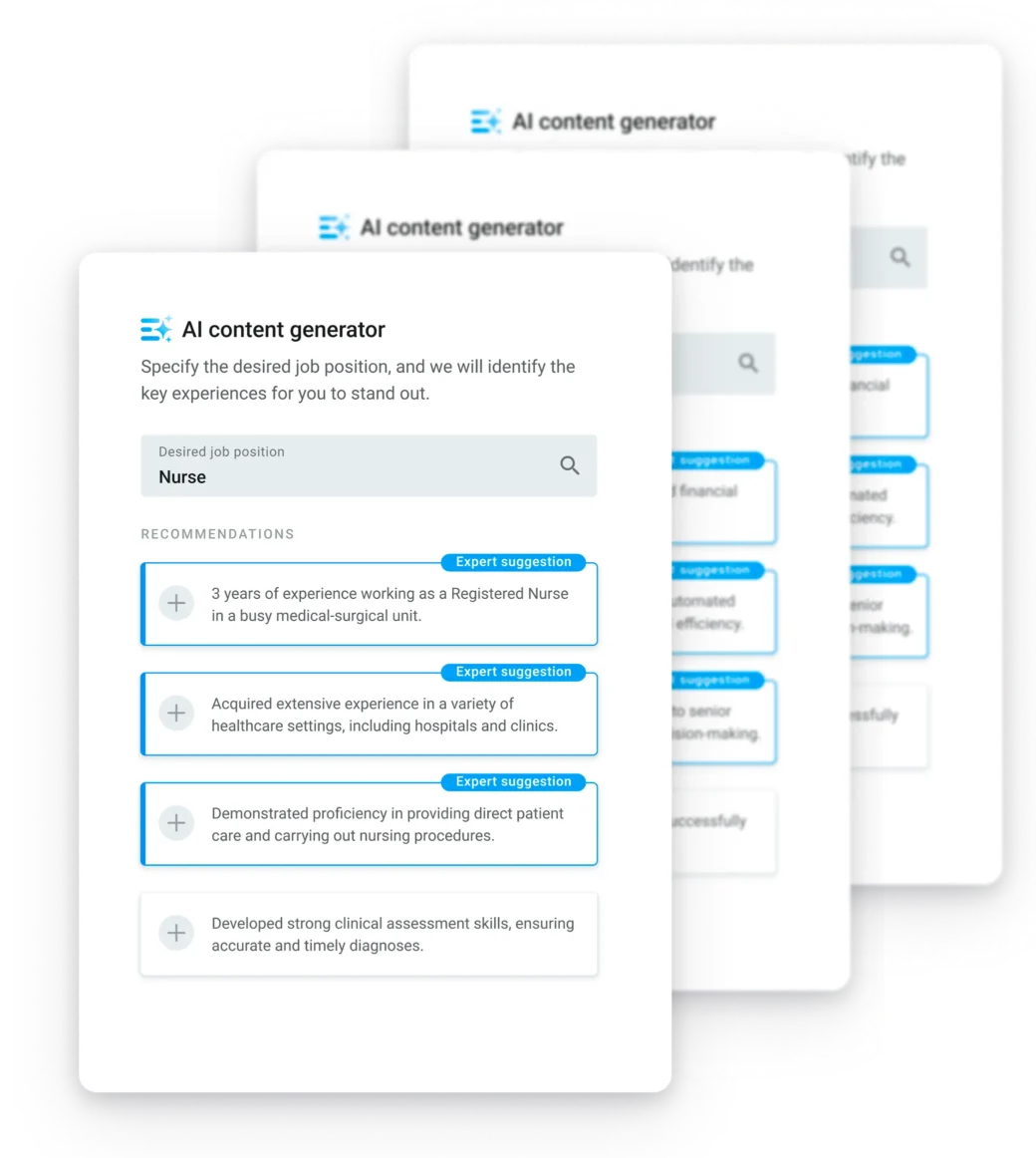Teamwork skills are crucial in the workplace, and employers expect effective collaboration, even in remote and hybrid settings. When you skim the job ads, it’s no surprise that the keyword ‘team player’ appears so frequently, and it should also appear in your resume.
To nail that interview, it’s important to list genuine teamwork abilities on your resume beyond just using buzzwords. Demonstrating teamwork abilities is as critical as any other qualification and should be articulated and tailored to the job requirements.
Keep reading to learn how to write a team player resume.
Are you in a hurry to write yours? Try our AI-powered resume builder, and you’ll be done in a few minutes! ResumeCoach’s AI skills generator will help you highlight your potential.
How to Convey Teamwork on a Resume
To start off with, if you’ve ever received any form of recognition for your teamwork skills, this is worth mentioning on your resume. Maybe you received an award for your teamwork efforts, served as a team lead, coordinated a project, or been given a special role that involves liaising between team members.
Another effective way to show collaboration skills on your resume is to include them in the skills section. The smartest thing to do is to tailor this section to each job application to clearly show how your skill set matches the job requirements.
The second step is to identify the keywords in the job description and write a teamwork skills checklist. Remember that employers now use Applicant Tracking Systems (ATS) to scan resumes, so if your resume doesn’t contain the right keywords, the employer won’t even see it.
At the same time, you need to do more than just use the keywords. Just saying you’re a team player on your resume isn’t convincing.
It’s much more effective to include specific examples of the actions you took as a team and what the successful outcome was. Listing KPIs and other metrics alongside your teamwork examples will demonstrate the impact you had.
You will also need to include teamwork examples in other sections of your resume, such as your work experience section.
How to List Teamwork Skills on Your Resume
So, let’s get down to the ‘how’. Here is our expert advice on how to include your teamwork examples throughout your resume:
- Identify relevant teamwork skills: Analyze the job description to determine the most important teamwork skills for the position. Tailor your resume to emphasize these skills, such as collaboration, communication, or problem-solving with others.
- Use action verbs: Start each bullet point with action verbs that demonstrate teamwork, such as “collaborated,” “partnered,” “coordinated,” or “supported.” This helps to create a more dynamic and engaging resume.
- Quantify accomplishments: Whenever possible, include quantifiable results to showcase the positive impact of your teamwork. Use percentages, numbers, or specific outcomes to highlight your achievements.
- Highlight specific projects: Provide examples of successful projects or initiatives where you worked as part of a team. Describe your role, the team’s goals, and the results achieved.
- Display teamwork in various contexts: Demonstrate your versatility by including examples of teamwork from different settings, such as work, school, or volunteer experiences.
Examine a wrong and right example of how to mention collaboration skills on your resume.
Wrong ❌
Worked on a new product line with coworkers.
This example does not go into enough detail and lacks a powerful verb to emphasize the collaboration. Take a look at this better example below:
Right ✅
Collaborated with a cross-functional team to develop and launch a new product line, resulting in a 20% increase in revenue.
Teamwork Skills Examples
There are plenty of cases where you can use as team player resume statements. If you add concrete data and evidence, you’ll easily be able to demonstrate on your resume that you are able to work in a team and independently.
Take a look at some examples of how to add team player skills to your resume:
- Facilitated collaboration among 3 departments, achieving project completion 10% ahead of schedule.
- Collaborated with cross-functional teams to develop and launch a new product line, leading to a 20% increase in company revenue and strengthened interdepartmental relationships.
- As the lead coordinator on a project team, I spearheaded a company-wide software upgrade that streamlined workflows and enhanced overall efficiency by 15%.
- Partnered with colleagues to create a mentorship program for new hires, resulting in a 30% decrease in employee turnover and improved workplace morale.
- Participated in a collaborative effort to redesign the company website, leading to a 25% increase in user engagement and improved brand recognition.
- Worked with 6 other fundraisers to raise over $800.
- Worked in a group of 5 people while delegating our tasks effectively and surpassed our yearly targets 3 years running.
💡Tip
Don’t go over the top with these numbers. Remember that not all jobs can be analyzed in such a way and that one or two points with statistics are enough.
Top 10 Teamwork Skills for Resumes
What teamwork skills are essential to the workplace? Here are some of the most important collaboration skills that empower value.
1. Reliability and punctuality
Completing tasks on time and being punctual are basic abilities. Reliable team members gain the trust of their colleagues and bosses and become valued workers. A team working well and efficiently relies on these core time management skills, and it’s important to highlight them on your resume.
2. Verbal and written communication skills
Whether it be by phone, email, or face-to-face, being able to communicate your ideas to other people clearly is an important part of most jobs. People with poor communication skills are difficult to work with and can be a nightmare to manage. This is one of the key areas employers assess during job interviews.
3. Listening skills
Good listening skills are an essential part of being an effective team member. It’s key to follow instructions, cooperate as a unit, and get along with colleagues and clients. Without strong listening skills, it’s difficult to show empathy and understanding. This is another key skill employers test during job interviews.
4. Positivity
Both positivity and negativity are contagious forces of energy. Everyone wants to work with colleagues, clients, and bosses who have a positive mindset. If you demonstrate any negativity on your resume or during the job interview, you probably won’t get hired. Negative people are more likely to complain, cause problems, and lack motivation.
5. Conflict management
Work can be tense, stressful, and problematic. This can cause friction between team members, which must be resolved before the team can continue functioning. The ability to mediate between other people is a valuable skill that employers look for in many roles including managers, team leaders, and HR managers.
6. Organizing and planning
A team player who looks out for the rest of the team by planning or aiding the group to stick to the plan enables the group to remain organized. Being able to keep on top of your own work while looking out for others shows competence and also helps to prove to your superiors that you are capable of managing a team.
7. Problem-solving
Whether visible or invisible, problems are typical in any workplace or team, and sometimes they are up to you to solve. Regardless of whether you are given a problem by others in your team to resolve or you detect your own problem and resolve it, both of these problem-solving qualities are of worth in the workplace.
If you can demonstrate solid critical thinking skills, and be the person who stays calm during problem periods, you can be a great asset to your team and become a reliable teammate.
8. Decision-making
Some find it tough, others easy; making decisions is not for everyone. A team player who doesn’t enjoy putting their foot down should seek to contribute to decisions by being present in group meetings, talking it through, and providing for and against arguments. Part of decision-making, after all, is not the decision itself but how and with whom you make it.
9. Persuasive skills
Have you ever agreed with all of your team on a certain topic and found it difficult to get the last team member on board? Sometimes all it takes is a simple conversation that can help that person see and understand your point of view.
Part of being persuasive is not just about changing people’s minds; it’s about empathizing with others, connecting, and understanding one another. This is a quality of teamwork like no other, and those who possess this quality can often be the team glue.
10. Feedback skills
Constructive criticism and evaluations all have their place when it comes to teamwork, and it’s important to make sure the traffic flows in both directions. Feedback should always be welcome amongst both team players and superiors.
Giving feedback doesn’t have to be a negative process and helps everyone to work on themselves.
How To Improve Teamwork Skills
It’s not enough to simply have teamwork skills on your resume; constantly improving them is also necessary.
The good news is that they are something that can be developed over time. Michael Jordan wouldn’t have won as much if Scottie Pippen didn’t also step up his game and vice versa.
Here are 5 ways to improve your teamwork skills, so you can become a top-notch team player and stand out to potential employers.
- Practice active listening: Good teamwork requires effective communication, and active listening is an essential part of that. When you listen actively, you are fully engaged with the speaker, focusing on their words, tone, and body language. By doing so, you can gain a better understanding of your teammates’ perspectives and needs.
- Be open to feedback: When you receive feedback from your teammates, be open to it, even if it’s critical. Use feedback as an opportunity to learn and grow, and use it to improve your work and relationships with your team.
- Be reliable: Dependability is an essential quality in any team member. If you commit to completing a task, make sure you follow through on that commitment. Being reliable means your teammates can trust you to do your part, and it helps build strong relationships and a positive team dynamic.
- Be flexible: Teamwork often requires flexibility and adaptability. Be willing to adjust your plans or approach if necessary to accommodate the team or project’s needs. Flexibility can help keep the team moving forward, even when unexpected challenges arise.
- Build relationships: Take the time to get to know your teammates on a personal level, and show an interest in their lives and interests. Building relationships can help create a more positive and supportive team environment, which can lead to better collaboration and productivity.
By following these five tips, you can improve your teamwork skills and become a more effective and valuable team member.
Incorporating these skills into your resume shows potential employers that you have what it takes to work well with others and contribute to a positive team environment.
Key Takeaways
Mastering the art of teamwork is essential for career advancement and making a meaningful impact in any professional setting.
Remember the following points when writing your resume:
- Effective examples: Use clear metrics and specific project results to illustrate your teamwork skills.
- Resume customization: Align your teamwork abilities with job descriptions using strategic keywords to ensure ATS compatibility.
- Skill enhancement: Continuously work to improve key teamwork skills, such as active listening and adaptability, to bolster your team contribution.
Still need help? Leverage our AI-powered resume builder to effectively present your teamwork skills and advance your career. Try it for free now!
FAQs
To effectively describe teamwork on a resume, focus on specific experiences where your collaborative efforts led to measurable outcomes. Start bullet points with action verbs like “collaborated,” “coordinated,” or “facilitated” to convey active participation.
Include quantifiable achievements, such as percentages or time frames, to illustrate the impact of your teamwork. Tailor these descriptions to match the teamwork skills listed in the job description, ensuring your resume aligns with what the employer is seeking.
Emphasize collaborative projects or roles where you actively contributed to team success. Use action verbs like “collaborated,” “coordinated,” or “facilitated” to start descriptions, highlighting how your involvement led to tangible results. Quantify these achievements when possible (e.g., “increased efficiency by 15%”).
For describing your teamwork skills specifically, focus on attributes that show your ability to interact effectively with others. Mention skills such as communication, conflict resolution, adaptability, and reliability. Provide examples that demonstrate these abilities in action, such as resolving team conflicts or adapting to new team strategies.
Yes, you can list teamwork as a skill on your resume. It’s important to not only state “teamwork” but also to back it up with specific examples that demonstrate your collaborative abilities.
Highlight instances where you effectively worked within a team to achieve goals, resolve conflicts, or lead projects. Use action verbs and quantifiable results to strengthen your case.
Related Posts





